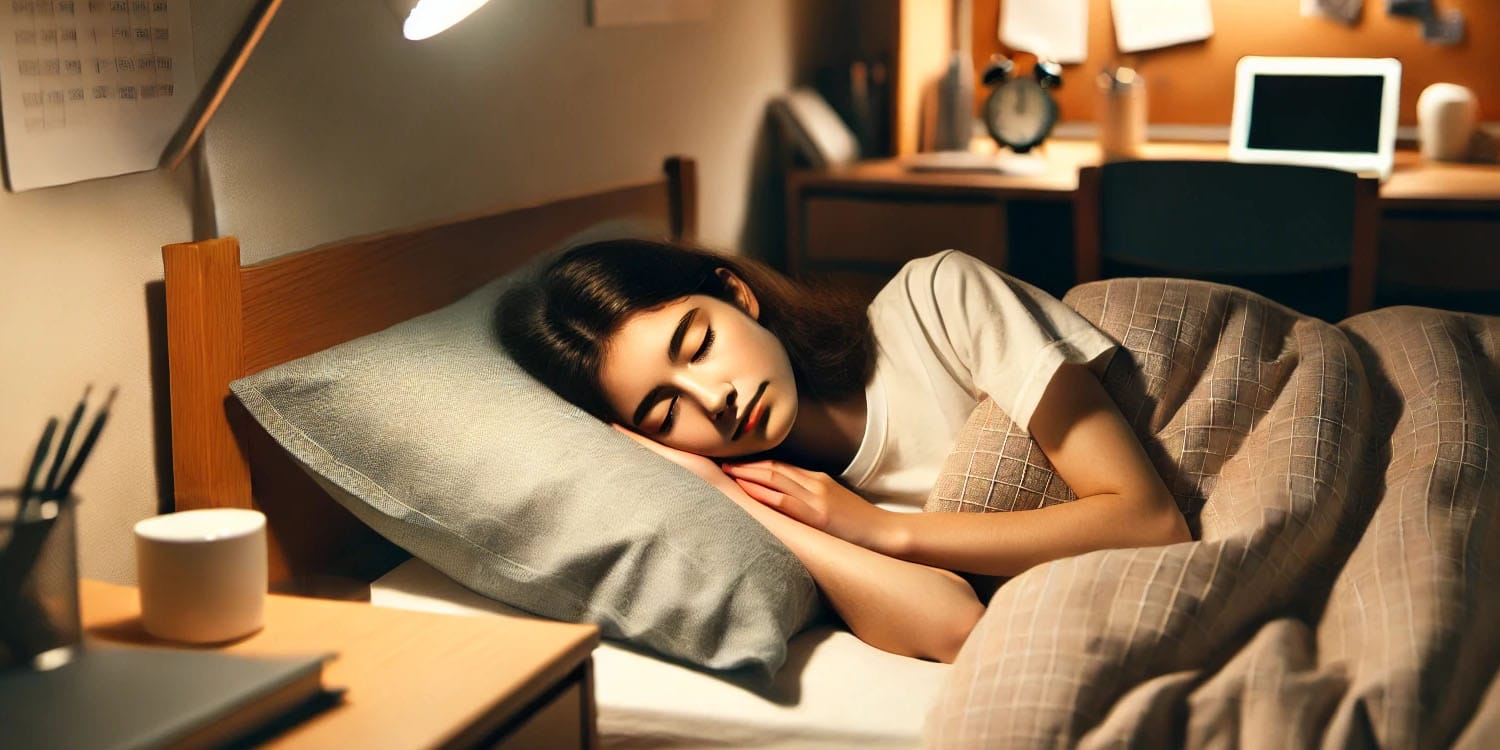New research published in the Journal of Sleep Research suggests that a specific type of sleep, known as rapid eye movement (REM) sleep or “dream sleep,” can predict how stressed college students feel before an important exam. The study found that students who experience more REM sleep earlier in the semester tend to have higher levels of anxiety as final exams approach. These findings add a fascinating layer to our understanding of how sleep affects emotional processing and stress in everyday life.
REM sleep is one of the five stages of the sleep cycle that our bodies naturally progress through during the night. REM sleep is characterized by rapid movement of the eyes, increased brain activity, and vivid dreams. Unlike other sleep stages, REM sleep is when the brain is most active, almost as if it were awake, even though the body remains in a state of temporary paralysis.
This stage of sleep is believed to play a crucial role in emotional regulation, memory consolidation, and processing of experiences and emotions. The duration and quality of REM sleep can significantly influence how we cope with stress and handle emotional challenges in our daily lives.
Given the established connection between sleep, particularly REM sleep, and emotional regulation, the researchers behind this study were motivated to explore whether habitual REM sleep could predict stress responses in everyday life situations. While much of the previous research focused on the effects of sleep on emotional processing in clinical populations or in response to traumatic events, this study sought to understand how REM sleep might influence stress in a more common and relatable context: academic stress among college students.
“Many studies examine the relationship between sleep and emotional and cognitive processing; however, the majority of studies do one of two things: they either evaluate how performance in cognitive and emotional tests is affected by sleep and its physiology measured for only a single night prior to test; or they test the relationship over longer periods but using subjective measures of sleep or, at best, objective measures that only probe sleep in its most general sense (total sleep time, sleep quality) rather than its detailed physiological properties,” said study author Itamar Lerner, an assistant professor at the University of Texas at San Antonio.
“My research work attempts to capitalize on new advances in mobile sleep monitoring to combine detailed evaluation of sleep physiology over multiple nights with measurement of emotional and cognitive processing. As part of this research agenda, I am looking at how habitual sleep and its physiology affect the management of stress – and that’s how I came to examine one instance of this relationship, namely, how habitual sleep affects test anxiety in college students.”
The study involved 52 undergraduate psychology students from the University of Texas at San Antonio. These students were monitored over a full semester, either in the fall or spring. To participate, students needed to commit to the study period, report getting at least six hours of sleep per night, and maintain regular alcohol and caffeine consumption. The researchers excluded students with pre-existing neurological or medical conditions that could affect sleep, those using medications influencing sleep, and anyone diagnosed with a sleep disorder.
Participants were trained to use a mobile sleep-monitoring device, which recorded their sleep at home for five consecutive nights early in the semester. This device, the Zmachine® Insight+, uses three electrodes placed on the head to monitor different stages of sleep, including REM sleep. Students also kept a sleep diary to record when they went to bed, when they woke up, and any nighttime awakenings.
In addition to monitoring sleep, the researchers assessed students’ stress levels and related factors using a variety of online questionnaires. The main focus was on test anxiety, measured with the Test Anxiety Inventory. This tool evaluates both the cognitive aspect of anxiety (worry) and the physical responses (emotionality) that students experience when faced with exams. Other factors like depression, resilience, sleep quality, and exposure to stressful life events were also measured to control for their potential influence on test anxiety.
The sleep data collected early in the semester was compared with the students’ stress levels just before final exams, when academic pressure was at its peak.
The researchers found that more REM sleep early in the semester predicted higher levels of test anxiety as exams approached. Specifically, students who spent more time in REM sleep, as well as those who had a higher percentage of their total sleep time in REM, reported greater increases in anxiety before finals. This was contrary to the researchers’ initial hypothesis, which predicted that more REM sleep would be associated with lower anxiety.
Further analysis showed that this increase in anxiety was particularly related to the emotionality dimension of test anxiety — the physical symptoms like a racing heart or sweaty palms that students might experience when they think about their exams. In contrast, the cognitive dimension of anxiety, which involves worrying about performance, did not seem to be as strongly affected by REM sleep.
Interestingly, the study found no significant relationship between REM sleep fragmentation — the number of times REM sleep is interrupted during the night — and test anxiety. This suggests that it is the amount of REM sleep, rather than its quality or continuity, that plays a more critical role in influencing stress levels before exams.
“The main results suggest that habitual REM sleep – or ‘dream sleep’ as it is better known – might influence how we process stress, and particularly how anxious we become before a test,” Lerner told PsyPost. “The results suggest that more REM sleep could actually contribute to maintaining some level of stress before the test; however, previous studies suggest that habitual REM sleep could also alleviate stress. The bottom line is that we need an adequate amount of sleep to have the right balance between a calm, non-anxious demeanor and a healthy anticipation before events that require our attention.”
Future research could expand on these findings by including a larger, more diverse sample of students and by exploring how REM sleep might influence stress in other real-world situations. “The long term goals are to examine how habitual sleep – particularly REM sleep – affect stress response in more extreme situations, such as emergency responders (firefighters, police officers, paramedics) responding to calls during their regular work,” Lerner said.
The study, “Habitual rapid eye movement sleep predicts changes in test-anxiety levels weeks in advance,” was authored by Emerson Larios and Itamar Lerner.




